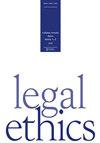Lawyer self-regulation and the public interest: a reflection
IF 0.3
Q1 LAW
引用次数: 0
Abstract
Lawyers in the US and the UK justify their self-regulatory powers as serving the public interest, a claim that prominent sociologists in both countries long credulously accepted. But there are ample reasons for skepticism. Western societies are founded on the belief that individuals are self-interested. Free markets allow them to maximise utility. Free alienability of property ensures it will be put to its best and highest use. The laws of copyright, patent and trade mark protect intellectual property in order to encourage creativity. Meritocratic educational systems motivate students to acquire knowledge and skills. We seek to align the interests of lawyers and clients, for instance, through contingent or conditional fees; because this is not always possible, however, ethical rules require lawyers to avoid conflicts of interest. Liberal democracies allow citizens to shape governmental action through interest group pluralism. The legal system promotes justice by encouraging the adversarial clash of zealous advocates. Laws respect individual autonomy through doctrines of informed consent, the right to die, and privacy. Competition is the driving force behind artistic expression and athletic contests. And our understanding of international relations is dominated by the realist view that every nation does and should pursue its self-interest. Given all this, why expect the legal profession to be different? History documents the self-interest of lawyer self-regulation. The primary challenge for any occupation seeking to become a profession is to control supply. The first task is to restrict the production of producers. Civil law professions, like the notary, achieved the ultimate protection: a numerus clausus (in which positions often were handed down from father to son). Common lawyers had to use other devices. As Weber noted, examinations became the dominant entry barrier in the twentieth century. These have an unproven – and arguably dubious – relationship to the knowledge lawyers actually utilise in their daily practice (in the language of psychologists: they have never been validated). Let me offer some exotic律师自律与公共利益:反思
美国和英国的律师证明他们的自律权力是为公众利益服务的,这一说法长期以来都被两国著名社会学家所轻信。但我们有充分的理由持怀疑态度。西方社会是建立在个人是利己主义的信念之上的。自由市场使他们能够最大限度地发挥效用。财产的自由可转让性确保了它将得到最佳和最高的使用。版权法、专利法和商标法保护知识产权,以鼓励创造力。精英教育制度激励学生学习知识和技能。我们寻求调整律师和客户的利益,例如,通过或有或有条件的费用;然而,因为这并不总是可能的,道德规则要求律师避免利益冲突。自由民主国家允许公民通过利益集团多元化来塑造政府行动。法律体系通过鼓励热心倡导者之间的对抗性冲突来促进正义。法律通过知情同意、死亡权和隐私原则尊重个人自主权。竞争是艺术表现和体育竞赛背后的驱动力。我们对国际关系的理解是由现实主义观点主导的,即每个国家都在追求自己的私利。既然如此,为什么期望法律界有所不同呢?历史记录了律师自我监管的自身利益。任何寻求成为职业的职业面临的主要挑战是控制供应。第一项任务是限制生产者的生产。民法专业,如公证员,实现了最终的保护:数字条款(职位通常由父亲传给儿子)。普通律师不得不使用其他手段。正如韦伯所指出的,考试在二十世纪成为了主要的入学障碍。这些与律师在日常实践中实际使用的知识有着未经证实的——也可以说是可疑的——关系(用心理学家的话来说:它们从未得到验证)。让我提供一些异国情调的
本文章由计算机程序翻译,如有差异,请以英文原文为准。
求助全文
约1分钟内获得全文
求助全文

 求助内容:
求助内容: 应助结果提醒方式:
应助结果提醒方式:


